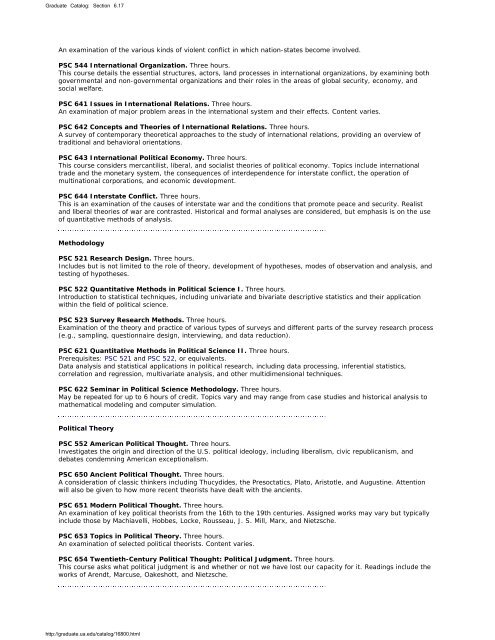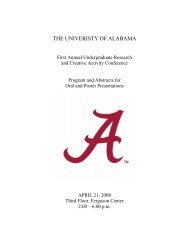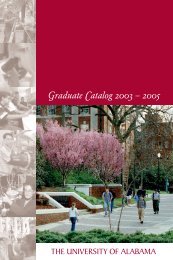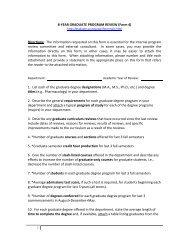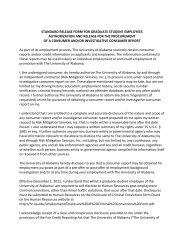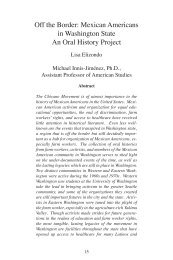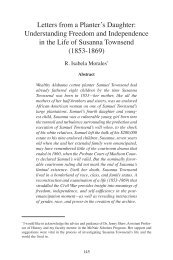- Page 1:
GRADUATE CATALOG 2009-2011http://gr
- Page 4 and 5:
Graduate Catalog: Index4. Academic
- Page 6 and 7:
Graduate Catalog: Index10. College
- Page 10 and 11:
Graduate Catalog: Section 2.1THE UN
- Page 12 and 13:
Graduate Catalog: Section 2.3,THE U
- Page 14 and 15:
Graduate SchoolThe University of Al
- Page 16 and 17:
Graduate Catalog: Section 2.7THE UN
- Page 18 and 19:
Graduate Catalog: Section 3.2THE UN
- Page 20 and 21:
Graduate Catalog: Section 3.4THE UN
- Page 22 and 23:
Graduate Catalog: Section 3.6THE UN
- Page 24 and 25:
Graduate Catalog: Section 3.8THE UN
- Page 26 and 27:
Graduate Catalog: Section 3.9THE UN
- Page 28 and 29:
Graduate Catalog: Section 3.9both t
- Page 30 and 31:
Graduate Catalog: Section 3.9Work o
- Page 32 and 33:
Graduate Catalog: Section 3.9Underg
- Page 34 and 35:
Graduate Catalog: Section 3.9entrep
- Page 36 and 37:
Graduate Catalog: Section 3.9MLIS F
- Page 38 and 39:
Graduate Catalog: Section 3.9Colleg
- Page 40 and 41:
Graduate Catalog: Section 3.9determ
- Page 42 and 43:
Graduate Catalog: Section 3.10THE U
- Page 44 and 45:
Graduate Catalog: Section 3.12THE U
- Page 46 and 47:
Graduate Catalog: Section 3.14THE U
- Page 48 and 49:
Graduate Catalog: Section 3.16THE U
- Page 50 and 51:
Graduate Catalog: Section 3.17Human
- Page 52 and 53:
Graduate Catalog: Section 3.19THE U
- Page 54 and 55:
Graduate Catalog: Section 3.19• A
- Page 56 and 57:
Graduate Catalog: Section 3.19Optio
- Page 58 and 59:
Graduate Catalog: Section 3.21THE U
- Page 60 and 61:
Graduate Catalog: Section 3.22D. If
- Page 62 and 63:
Graduate Catalog: Section 4.2THE UN
- Page 64 and 65:
Graduate Catalog: Section 4.3Applic
- Page 66 and 67:
Graduate Catalog: Section 4.4Condit
- Page 68 and 69:
Graduate Catalog: Section 4.4• Co
- Page 70 and 71:
Graduate Catalog: Section 4.4any te
- Page 72 and 73:
Graduate Catalog: Section 4.5THE UN
- Page 74 and 75:
Graduate Catalog: Section 4.6THE UN
- Page 76 and 77:
Graduate Catalog: Section 4.74.7.3
- Page 78 and 79:
Graduate Catalog: Section 4.8Readmi
- Page 80 and 81:
Graduate Catalog: Section 4.10THE U
- Page 82 and 83:
Graduate Catalog: Section 4.11Servi
- Page 84 and 85:
Graduate Catalog: Section 4.11highe
- Page 86 and 87:
Graduate Catalog: Section 4.11Docto
- Page 88 and 89:
Graduate Catalog: Section 4.11which
- Page 90 and 91:
Graduate Catalog: Section 4.11tradi
- Page 92 and 93:
Graduate Catalog: Section 5.1THE UN
- Page 94 and 95:
Graduate Catalog: Section 6.1centur
- Page 96 and 97:
Graduate Catalog: Section 6.2THE UN
- Page 98 and 99:
Graduate Catalog: Section 6.2ANT 52
- Page 100 and 101:
Graduate Catalog: Section 6.2ANT 69
- Page 102 and 103:
Graduate Catalog: Section 6.3THE UN
- Page 104 and 105:
Graduate Catalog: Section 6.3ART 60
- Page 106 and 107:
Graduate Catalog: Section 6.4THE UN
- Page 108 and 109:
Graduate Catalog: Section 6.4This c
- Page 110 and 111:
Graduate Catalog: Section 6.4BSC 59
- Page 112 and 113:
Graduate Catalog: Section 6.5THE UN
- Page 114 and 115:
Graduate Catalog: Section 6.5CH 603
- Page 116 and 117:
Graduate Catalog: Section 6.6THE UN
- Page 118 and 119:
Graduate Catalog: Section 6.7THE UN
- Page 120 and 121:
Graduate Catalog: Section 6.7Prepar
- Page 122 and 123:
Graduate Catalog: Section 6.8Degree
- Page 124 and 125:
Graduate Catalog: Section 6.8applic
- Page 126 and 127:
Graduate Catalog: Section 6.8histor
- Page 128 and 129:
Graduate Catalog: Section 6.8EN 543
- Page 130 and 131: Graduate Catalog: Section 6.8EN 627
- Page 132 and 133: Graduate Catalog: Section 6.9THE UN
- Page 134 and 135: Graduate Catalog: Section 6.9GY 560
- Page 136 and 137: Graduate Catalog: Section 6.10proce
- Page 138 and 139: Graduate Catalog: Section 6.10GEO 6
- Page 140 and 141: Graduate Catalog: Section 6.11Requi
- Page 142 and 143: Graduate Catalog: Section 6.11the d
- Page 144 and 145: Graduate Catalog: Section 6.11HY 55
- Page 146 and 147: Graduate Catalog: Section 6.12THE U
- Page 148 and 149: Graduate Catalog: Section 6.12MS 55
- Page 150 and 151: Graduate Catalog: Section 6.13MATH
- Page 152 and 153: Graduate Catalog: Section 6.13MATH
- Page 154 and 155: Graduate Catalog: Section 6.13MATH
- Page 156 and 157: Graduate Catalog: Section 6.14Maste
- Page 158 and 159: Graduate Catalog: Section 6.14Colon
- Page 160 and 161: Graduate Catalog: Section 6.14Cours
- Page 162 and 163: Graduate Catalog: Section 6.14GN 53
- Page 164 and 165: Graduate Catalog: Section 6.14SP 60
- Page 166 and 167: Graduate Catalog: Section 6.15For t
- Page 168 and 169: Graduate Catalog: Section 6.15Funda
- Page 170 and 171: Graduate Catalog: Section 6.15semes
- Page 172 and 173: Graduate Catalog: Section 6.15MUS 6
- Page 174 and 175: Graduate Catalog: Section 6.16THE U
- Page 176 and 177: Graduate Catalog: Section 6.16PH 58
- Page 178 and 179: Graduate Catalog: Section 6.17THE U
- Page 182 and 183: Graduate Catalog: Section 6.17Publi
- Page 184 and 185: Graduate Catalog: Section 6.18• T
- Page 186 and 187: Graduate Catalog: Section 6.18PY 64
- Page 188 and 189: Graduate Catalog: Section 6.19THE U
- Page 190 and 191: Graduate Catalog: Section 6.19to cr
- Page 192 and 193: Graduate Catalog: Section 6.19A cou
- Page 194 and 195: Graduate Catalog: Section 6.20by an
- Page 196 and 197: Graduate Catalog: Section 7.1THE UN
- Page 198 and 199: Graduate Catalog: Section 7.2The Te
- Page 200 and 201: Graduate Catalog: Section 7.3can be
- Page 202 and 203: Graduate Catalog: Section 7.4THE UN
- Page 204 and 205: Graduate Catalog: Section 7.4.4glob
- Page 206 and 207: Graduate Catalog: Section 7.4.5Admi
- Page 208 and 209: Graduate Catalog: Section 7.4.7THE
- Page 210 and 211: Graduate Catalog: Section 7.4.8Elec
- Page 212 and 213: Graduate Catalog: Section 7.4.9THE
- Page 214 and 215: Graduate Catalog: Section 7.4.10THE
- Page 216 and 217: Graduate Catalog: Section 7.4.11THE
- Page 218 and 219: Graduate Catalog: Section 7.4.12THE
- Page 220 and 221: Graduate Catalog: Section 7.5THE UN
- Page 222 and 223: Graduate Catalog: Section 7.5field
- Page 224 and 225: Graduate Catalog: Section 7.6.1AC 5
- Page 226 and 227: Graduate Catalog: Section 7.6.2THE
- Page 228 and 229: Graduate Catalog: Section 7.6.2EC 6
- Page 230 and 231:
Graduate Catalog: Section 7.6.3FI 5
- Page 232 and 233:
Graduate Catalog: Section 7.6.4THE
- Page 234 and 235:
Graduate Catalog: Section 7.6.6THE
- Page 236 and 237:
Graduate Catalog: Section 7.6.8THE
- Page 238 and 239:
Graduate Catalog: Section 7.6.9MGT
- Page 240 and 241:
Graduate Catalog: Section 7.6.10MIS
- Page 242 and 243:
Graduate Catalog: Section 7.6.11OM
- Page 244 and 245:
Graduate Catalog: Section 7.6.12pri
- Page 246 and 247:
Graduate Catalog: Section 7.6.13THE
- Page 248 and 249:
Graduate Catalog: Section 7.6.13ST
- Page 250 and 251:
Graduate Catalog: Section 8.2THE UN
- Page 252 and 253:
Graduate Catalog: Section 8.3THE UN
- Page 254 and 255:
Graduate Catalog: Section 8.4Semest
- Page 256 and 257:
Graduate Catalog: Section 8.5THE UN
- Page 258 and 259:
Graduate Catalog: Section 8.6THE UN
- Page 260 and 261:
Graduate Catalog: Section 8.7THE UN
- Page 262 and 263:
Graduate Catalog: Section 8.7LS 500
- Page 264 and 265:
Graduate Catalog: Section 8.7of the
- Page 266 and 267:
Graduate Catalog: Section 8.8Course
- Page 268 and 269:
Graduate Catalog: Section 8.9A stud
- Page 270 and 271:
Graduate Catalog: Section 8.9after
- Page 272 and 273:
Graduate Catalog: Section 8.9.1THE
- Page 274 and 275:
Graduate Catalog: Section 8.10.2THE
- Page 276 and 277:
Graduate Catalog: Section 8.10.3THE
- Page 278 and 279:
Graduate Catalog: Section 8.10.3CIS
- Page 280 and 281:
Graduate Catalog: Section 8.10.4COM
- Page 282 and 283:
Graduate Catalog: Section 8.10.6THE
- Page 284 and 285:
Graduate Catalog: Section 8.10.6ope
- Page 286 and 287:
Graduate Catalog: Section 8.10.6CIS
- Page 288 and 289:
Graduate Catalog: Section 8.10.8THE
- Page 290 and 291:
Graduate Catalog: Section 9.2THE UN
- Page 292 and 293:
Graduate Catalog: Section 10.2THE U
- Page 294 and 295:
Graduate Catalog: Section 10.2Polic
- Page 296 and 297:
Graduate Catalog: Section 10.3Chang
- Page 298 and 299:
Graduate Catalog: Section 10.5THE U
- Page 300 and 301:
Graduate Catalog: Section 10.5disse
- Page 302 and 303:
Graduate Catalog: Section 10.5Stude
- Page 304 and 305:
Graduate Catalog: Section 10.6Degre
- Page 306 and 307:
Graduate Catalog: Section 10.6advan
- Page 308 and 309:
Graduate Catalog: Section 10.6.1AEL
- Page 310 and 311:
Graduate Catalog: Section 10.6.1and
- Page 312 and 313:
Graduate Catalog: Section 10.6.1AHE
- Page 314 and 315:
Graduate Catalog: Section 10.6.1BEF
- Page 316 and 317:
Graduate Catalog: Section 10.7Candi
- Page 318 and 319:
Graduate Catalog: Section 10.7.1THE
- Page 320 and 321:
Graduate Catalog: Section 10.7.1BCE
- Page 322 and 323:
Graduate Catalog: Section 10.7.1BEP
- Page 324 and 325:
Graduate Catalog: Section 10.7.1BER
- Page 326 and 327:
Graduate Catalog: Section 10.8.1THE
- Page 328 and 329:
Graduate Catalog: Section 10.8.1Fie
- Page 330 and 331:
Graduate Catalog: Section 10.8.2THE
- Page 332 and 333:
Graduate Catalog: Section 10.8.2inc
- Page 334 and 335:
Graduate Catalog: Section 10.8.2CIE
- Page 336 and 337:
Graduate Catalog: Section 10.8.2Des
- Page 338 and 339:
Graduate Catalog: Section 10.9THE U
- Page 340 and 341:
Graduate Catalog: Section 10.9SPE 5
- Page 342 and 343:
Graduate Catalog: Section 10.10THE
- Page 344 and 345:
Graduate Catalog: Section 10.11THE
- Page 346 and 347:
Graduate Catalog: Section 10.11MUE
- Page 348 and 349:
Graduate Catalog: Section 11.1THE U
- Page 350 and 351:
Graduate Catalog: Section 11.3THE U
- Page 352 and 353:
Graduate Catalog: Section 11.4THE U
- Page 354 and 355:
Graduate Catalog: Section 11.6.1THE
- Page 356 and 357:
Graduate Catalog: Section 11.6.2THE
- Page 358 and 359:
Graduate Catalog: Section 11.6.2AEM
- Page 360 and 361:
Graduate Catalog: Section 11.6.2cut
- Page 362 and 363:
Graduate Catalog: Section 11.6.3THE
- Page 364 and 365:
Graduate Catalog: Section 11.6.3CHE
- Page 366 and 367:
Graduate Catalog: Section 11.6.4hou
- Page 368 and 369:
Graduate Catalog: Section 11.6.4con
- Page 370 and 371:
Graduate Catalog: Section 11.6.5THE
- Page 372 and 373:
Graduate Catalog: Section 11.6.5CS
- Page 374 and 375:
Graduate Catalog: Section 11.6.5Pre
- Page 376 and 377:
Graduate Catalog: Section 11.6.6Cou
- Page 378 and 379:
Graduate Catalog: Section 11.6.6des
- Page 380 and 381:
Graduate Catalog: Section 11.6.7THE
- Page 382 and 383:
Graduate Catalog: Section 11.6.7Pre
- Page 384 and 385:
Graduate Catalog: Section 11.6.8THE
- Page 386 and 387:
Graduate Catalog: Section 11.6.8MTE
- Page 388 and 389:
Graduate Catalog: Section 12.1.1THE
- Page 390 and 391:
Graduate Catalog: Section 12.2THE U
- Page 392 and 393:
Graduate Catalog: Section 12.3.1THE
- Page 394 and 395:
Graduate Catalog: Section 12.3.2CTD
- Page 396 and 397:
Graduate Catalog: Section 12.3.3CSM
- Page 398 and 399:
Graduate Catalog: Section 12.3.4THE
- Page 400 and 401:
Graduate Catalog: Section 12.3.4HHE
- Page 402 and 403:
Graduate Catalog: Section 12.3.5HD
- Page 404 and 405:
Graduate Catalog: Section 12.3.6NHM
- Page 406 and 407:
Graduate Catalog: Section 13.1Campu
- Page 408 and 409:
Graduate Catalog: Section 14.2THE U
- Page 410 and 411:
Graduate Catalog: Section 14.2SAMPL
- Page 412 and 413:
Graduate Catalog: Section 14.2Thesi
- Page 414 and 415:
Graduate Catalog: Section 14.3Sprin
- Page 416 and 417:
Graduate Catalog: Section 14.4Sprin
- Page 418 and 419:
Graduate Catalog: Section 14.5Stude
- Page 420 and 421:
Graduate Catalog: Section 14.6Time
- Page 422 and 423:
Graduate Catalog: Section 14.7THE U
- Page 424 and 425:
Graduate Catalog: Section 14.7Sprin
- Page 426 and 427:
Graduate Catalog: Section 14.8THE U
- Page 428 and 429:
Graduate Catalog: Section 14.8NUR 7
- Page 430 and 431:
Graduate Catalog: Section 15.1THE U
- Page 432 and 433:
Graduate Catalog: Section 15.1Build
- Page 434 and 435:
Graduate Catalog: Section 15.2THE U
- Page 436 and 437:
Graduate Catalog: Section 15.2Requi
- Page 438 and 439:
Graduate Catalog: Section 15.3THE U
- Page 440 and 441:
Graduate Catalog: Section 15.3Indep
- Page 442 and 443:
Graduate Catalog: Section 15.3Famil
- Page 444 and 445:
Graduate Catalog: Section 15.4THE U
- Page 446 and 447:
Graduate Catalog: Section 15.4Addit
- Page 448:
Graduate Catalog: Section 15.5SW 64


